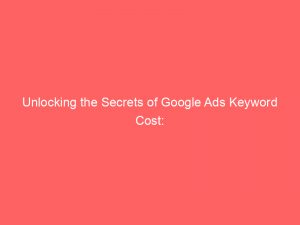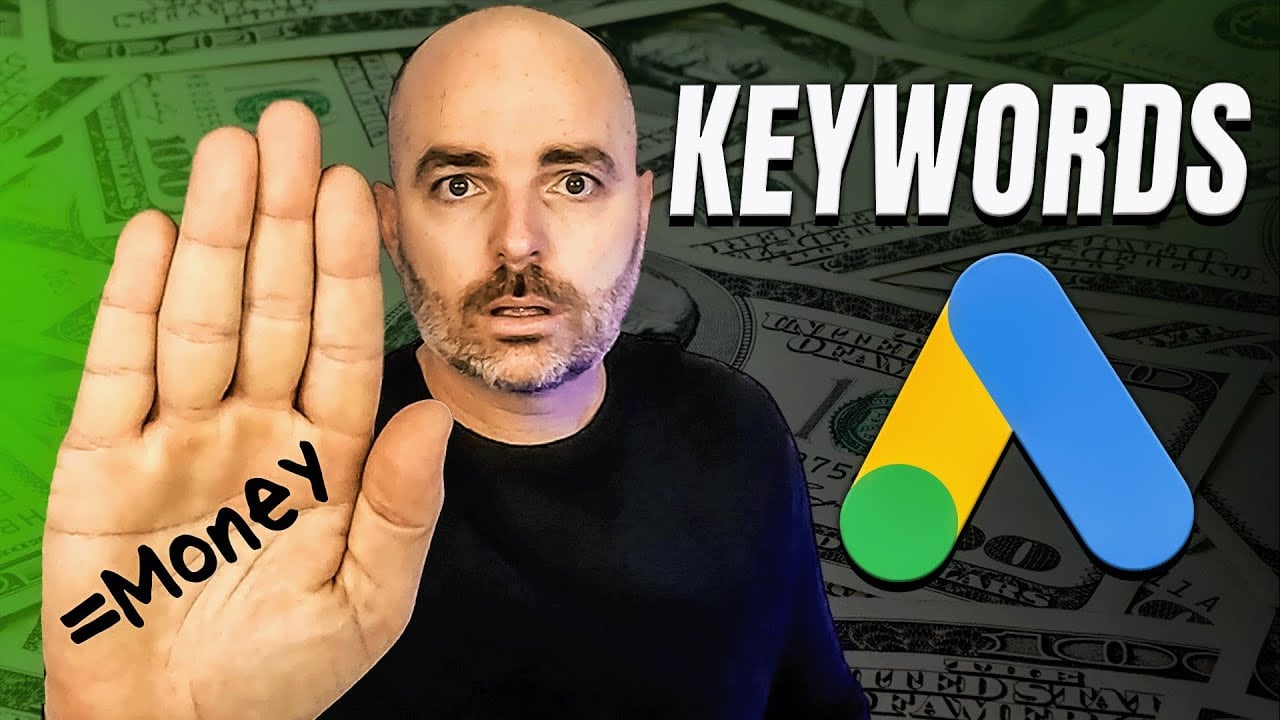- google ads keyword cost
- Maximize Clicks Vs Manual CPC Bidding
- Starting With A $1 Max CPC Bid
- Identifying Keywords That Need Manual Bid Adjustments
- Recommendations For Bid Adjustments
- Using The Bid Simulator For Bid Adjustments
- Using The Google Ads Simulator For Click, Cost, And Impression Data Estimates
- Maximizing Conversions With Enhanced CPC (ECPC)
- Tracking Conversions And Desired Actions
Imagine running a business in a digital world, hoping to expand your reach and attract customers. You enter the realm ofGoogleAds, the powerhouse of online advertising.
As you delve into the intricate workings of this platform, you stumble upon a crucial dilemma: the cost of keywords. How do you ensure that every dollar spent on bidding results in optimal ad placement, reaching the coveted first page of search results?
In this article, we unravel the mysteries of GoogleAds bidding strategies, dissecting the differences between automated Maximize Clicks and manual CPC strategies. Brace yourself for valuable insights and actionable recommendations that will skyrocket your ad game.
| Item | Details |
|---|---|
| Topic | Unlocking the Secrets of Google Ads Keyword Cost: Strategies for Affordable Advertising |
| Category | Ads |
| Key takeaway | Imagine running a business in a digital world, hoping to expand your reach and attract customers. You enter the realm of Google Ads, the powerhouse of online advertising. |
| Last updated | December 28, 2025 |
google ads keyword cost
The cost of keywords in Google Ads can vary depending on various factors, including the bidding strategy chosen by the advertiser. Google Ads offers two main bidding options: automated Maximize Clicks and manual CPC bidding.
Maximize Clicks is a bid strategy for advertisers who want to get the most clicks within their budget. With this strategy, Google’s algorithm automatically adjusts bids to maximize the number of clicks received.
On the other hand, manual CPC bidding allows advertisers to manage their maximum cost-per-click (CPC) bids themselves. Advertisers can start with a max CPC bid of US$1 and easily switch between Maximize Clicks and manual CPC bidding.
Google Ads tools can assist advertisers in identifying keywords that may need manual bid adjustments. Recommendations in the account can also suggest increased or decreased bids.
Additionally, the Bid Simulator allows advertisers to run “what-if” scenarios to adjust their bids. The Google Ads simulator can estimate click, cost, and impression data for ads based on different keyword bids.
Moreover, there are bid strategies like Enhanced CPC (ECPC), which maximize conversions while maintaining the same cost-per-conversion. Tracking conversions can help determine which keywords drive desired actions.
Google Ads provides first page bid estimates, top of page bid estimates, and first position bid estimates to give advertisers an idea of the likely bid needed to achieve specific ad positions. Ad position is influenced by Quality Score and competition.
To get ads to show on the first page of Google search results, strategies are suggested to improve Quality Score, increase bid amounts, and optimize ad relevance.
Optimized content based on recent advertiser behavior.
Key Points:
- Google Ads offers two main bidding options:
- automated Maximize Clicks
- manual CPC bidding
- Maximize Clicks automatically adjusts bids to maximize the number of clicks received
- Manual CPC bidding allows advertisers to manage their maximum cost-per-click bids themselves
- Google Ads tools assist in identifying keywords that may need manual bid adjustments
- The Bid Simulator allows advertisers to run “what-if” scenarios to adjust their bids
- Google Ads provides bid estimates to give advertisers an idea of the likely bid needed to achieve specific ad positions
Sources
https://ads.google.com/intl/en_us/home/tools/keyword-planner/
https://support.google.com/google-ads/answer/2472712?hl=en
https://support.google.com/google-ads/answer/7337243?hl=en
https://fitsmallbusiness.com/google-ads-cost/
Check this out:
💡 Pro Tips:
1. Use specific and targeted keywords: Focus on using highly relevant and specific keywords in your Google Ads campaigns to ensure that your ads are reaching the right audience and avoiding unnecessary clicks that may cost you more.
2. Optimize your landing pages: Make sure that your landing pages are optimized for conversions. A well-designed and user-friendly landing page will encourage visitors to take the desired action, reducing bounce rates and potentially lowering your keyword costs.
3. Regularly review and optimize your campaign: Regularly review the performance of your Google Ads campaigns to identify any underperforming keywords or ads. Adjust your bids or pause keywords that are costing you too much without generating the desired results.
4. Utilize negative keywords: Incorporate negative keywords into your campaigns to prevent your ads from displaying on irrelevant search queries. This can help you reduce costs by avoiding clicks from users who are unlikely to convert.
5. Test different bidding strategies: Experiment with different bidding strategies to find the one that works best for your goals and budget. Consider using automated bidding strategies like Target CPA or Target ROAS to optimize your bids and maximize your return on investment.
Maximize Clicks Vs Manual CPC Bidding
When it comes to Google Ads keyword cost, advertisers have two options: automated Maximize Clicks bid strategy or manual CPC bidding. Each strategy has its own advantages and can be used to achieve different objectives.
Maximize Clicks is a bidding strategy designed for advertisers who want to get the most clicks within their budget. This automated approach allows Google Ads to set bids on your behalf in order to maximize the number of clicks your ads receive.
It is a great option for advertisers who are primarily focused on driving traffic to their website and increasing brand awareness.
On the other hand, manual CPC bidding gives advertisers more control over their max CPC bids. With manual CPC bidding, advertisers can set and manage their own bid amounts.
This strategy is ideal for advertisers who want to have a more hands-on approach to their campaign and have specific goals in mind, such as controlling the cost per click or focusing on specific keywords.
Starting With A $1 Max CPC Bid
For new advertisers, it is possible to start with a max CPC bid of US$1. This allows them to test the waters and get a feel for how the bidding system works.
Starting with a lower bid can also be a cost-effective way to gauge the performance of their ads and make necessary adjustments before committing to higher bids.
It’s worth noting that starting with a $1 max CPC bid does not limit advertisers to using only Maximize Clicks. They can easily switch between Maximize Clicks and manual CPC bidding based on their campaign goals and budget.
Identifying Keywords That Need Manual Bid Adjustments
Google Ads tools offer valuable insights into keywords that may need manual bid adjustments. By analyzing the performance of keywords, advertisers can identify those that are not performing well and may require bid adjustments.
These tools can also highlight keywords that have high potential and may benefit from increased bids.
In addition, recommendations in the account can suggest increased or decreased bids for specific keywords. Advertisers should regularly review these recommendations to ensure their bids align with their campaign goals.
Recommendations For Bid Adjustments
When it comes to bid adjustments, there are a few key factors to consider. Advertisers should take into account the performance of their keywords, their campaign goals, and their budget.
It is important to strike a balance between bid amounts that are competitive enough to reach their target audience and bids that are cost-effective.
Google Ads provides estimates such as first page bid estimates, top of page bid estimates, and first position bid estimates, which help advertisers understand the likely bid needed to achieve specific ad placements. These estimates give advertisers an idea of the competitive landscape and help inform their bid adjustment decisions.
Using The Bid Simulator For Bid Adjustments
The Bid Simulator is a powerful tool that allows advertisers to run “what-if” scenarios to adjust their bids. This tool provides insights into how bid changes can impact the performance of their ads.
By experimenting with different bid amounts, advertisers can fine-tune their bids to optimize for their desired outcomes.
The Bid Simulator takes into consideration factors such as Quality Score and competition to provide accurate estimates. It helps advertisers understand how adjusting bids can affect ad position, click-through rates, and overall campaign performance.
Using The Google Ads Simulator For Click, Cost, And Impression Data Estimates
Another useful tool offered by Google Ads is the Google Ads simulator. This tool allows advertisers to estimate the click, cost, and impression data for their ads based on different keyword bids.
Advertisers can input various bid amounts and the simulator will provide insights into how these changes can impact their campaign.
The Google Ads simulator is a valuable resource for advertisers looking to optimize their bidding strategy. It helps advertisers make more informed decisions by providing data-driven estimates on the potential outcomes of their bid adjustments.
Maximizing Conversions With Enhanced CPC (ECPC)
Enhanced CPC (ECPC) is a bid strategy that aims to maximize conversions while maintaining the same cost-per-conversion. This automated bidding strategy adjusts bids in real-time based on the likelihood of conversion.
ECPC takes into account factors such as user device, location, and time of day to optimize bids for conversions.
Implementing ECPC can be beneficial for advertisers who are focused on driving specific actions, such as purchases or form submissions. By leveraging the power of machine learning, ECPC can help advertisers achieve their conversion goals more efficiently.
Tracking Conversions And Desired Actions
Conversion tracking is a crucial part of any Google Ads campaign. It allows advertisers to track which keywords are driving desired actions, such as purchases, sign-ups, or downloads.
By implementing conversion tracking, advertisers can gain insights into the effectiveness of their keywords and identify areas for improvement.
Tracking conversions not only helps advertisers measure the success of their campaigns, but it also enables them to make data-driven decisions when it comes to bid adjustments. By focusing on keywords that drive conversions, advertisers can optimize their bidding strategy and allocate their budget more effectively.
In conclusion, understanding the difference between automated Maximize Clicks bid strategy and manual CPC bidding is important when it comes to managing Google Ads keyword cost. By leveraging the various tools and strategies available, advertisers can optimize their bidding strategy, track conversions, and achieve their advertising goals.
With careful analysis and adjustments, advertisers can unlock the secrets of Google Ads keyword cost and run affordable and effective advertising campaigns.
Native Ad Network • Advertising Platform for Marketers • Self-Serve DSP Platform • Programmatic Advertising • Performance Marketing Tips











